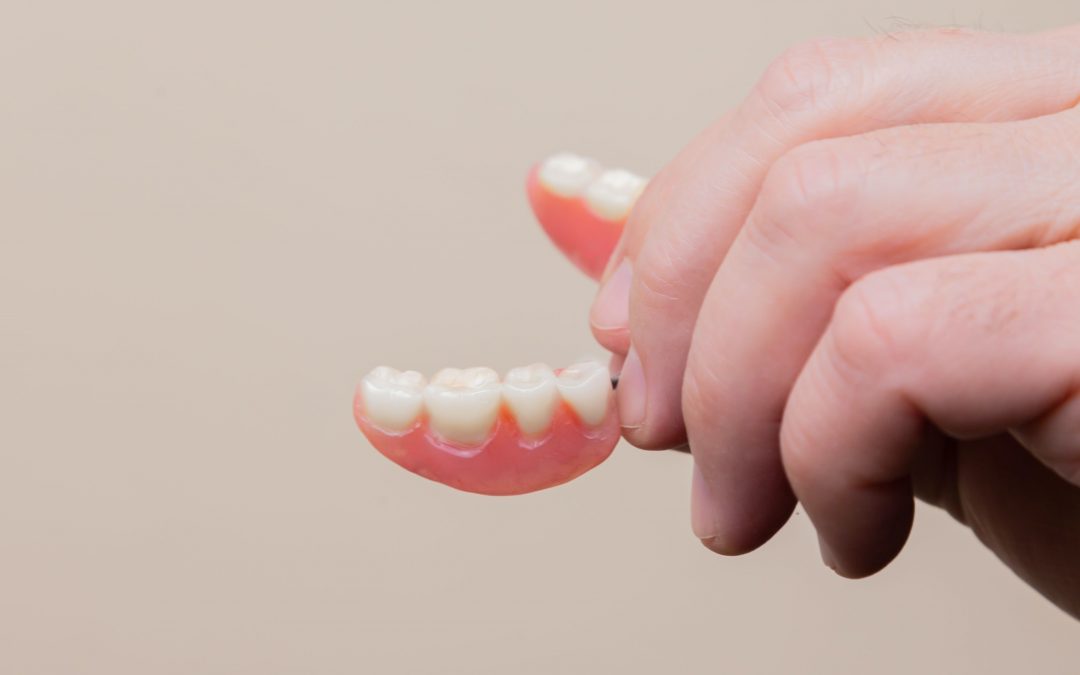Dentures are part of life for many seniors, but proper care of your dental implants can be vital to keeping them healthy and safe. Food particles and bacteria can affect dentures, just like your original teeth. If you have complete or partial dentures, it is important to take the time to properly maintain them. This article will discuss cleaning and maintenance tips for dentures.
Daily Care and Cleaning for Dentures
Like regular teeth, your dentures will need to be cleaned and cared for each day. When cleaning dentures, be sure to follow these tips. First, place a folded towel or other soft, plush surface over the table or counter where you will be cleaning them. This will help reduce the risk of breaking them if you happen to drop them. Next, rinse the dentures under cool water thoroughly. This will help remove surface food particles. Be sure not to use hot water, which could result in warping.
When cleaning, use a soft-bristled toothbrush and commercial denture cleaner. The soft bristles will help you get deeper without creating scrapes and damage to the implant. Do not use toothpaste, as most varieties are too abrasive for false teeth. Be sure to rinse thoroughly with cool water afterward.
Storing Overnight
You should store dentures overnight in either cool water or denture cleaning tablets in cool water. While many people will put their dentures into a glass of water at the end of the day, this is not the best vessel for them. A common drinking glass can be problematic for some seniors who may have issues with gripping the glass or the dentures in the water. Additionally, forgetful seniors may drink the water by accident.
Consider purchasing a denture bath. Denture baths are shallow plastic cases that can hold the implants plus liquids. They have a lid, which prevents dust and particulates from falling into the liquid. More advanced models may include baskets for easy extraction or vibrating baths that help keep your false teeth clean.
Preparing Foods with Dentures
Many people with dentures have a hard time chewing tougher foods, such as some meats. If you or your loved one is struggling to eat tougher foods, consider making an appointment for a refitting. If the problem still persists, consider altering their diet towards softer foods. Just make sure that they are still receiving the proper nutrition. Before changing your diet in a significant way, speak with your primary care physician or nutritionist for more help.
Damaged Dentures?
If your dentures are damaged, warped, or ill-fitting, do not attempt to fix them yourself. Instead, take them to a professional for repair and refitting. Home repair jobs can often make the problem worse. Furthermore, they can even lead to permanent mouth or gum damage.
Regular Dental Visits
Many people assume that once they no longer have teeth, they no longer need to visit the dentist, but this is false. Your dentist can keep an eye on how your dentures fit, as well as how much they affect your mouth. Additionally, your dentist can help you maintain your mouth and gum health, which can be vital to proper hygiene and denture care.
Safe Harbor Healthcare Services does not provide medical, healthcare, or financial advice via articles. This material has been prepared for informational purposes only. It is not intended to provide, and should not be relied on for medical advice.
Safe Harbor Healthcare Services has been providing excellent home care on Staten Island since 1967. Our services help the elderly and disabled live safely and independently; while giving their families the peace of mind they need. For more information contact us by clicking here, or call (718)-979-6900.

